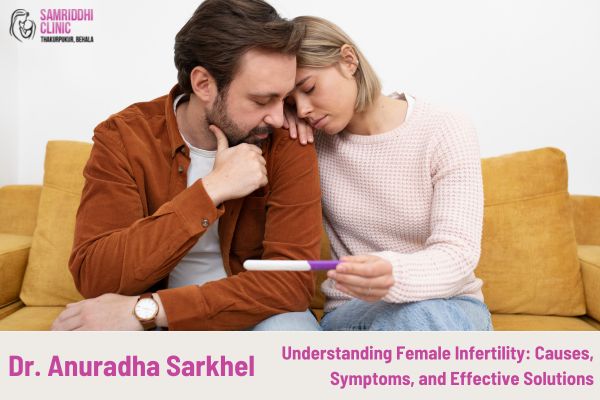Understanding Female Infertility: Causes, Symptoms, and Solutions with Dr. Anuradha Sarkhel
Infertility is a common yet challenging issue faced by many women today. It can be emotionally taxing, especially when trying to navigate the vast array of potential causes and treatments available. Female infertility is a condition that affects a significant number of women worldwide and can occur due to a variety of reasons. In this blog, Dr. Anuradha Sarkhel, an expert in the field of gynecology and reproductive health, provides insights into the causes, symptoms, and the latest treatment options for overcoming infertility.
What Is Female Infertility?
Female infertility is generally defined as the inability to conceive after one year of regular, unprotected intercourse. While infertility can occur due to a variety of factors, both age and underlying medical conditions are often key contributors. It’s important to remember that infertility affects both men and women, but understanding the causes specific to women is crucial in exploring potential solutions.
Common Causes of Female Infertility
- Ovulation Disorders: One of the leading causes of female infertility is irregular ovulation. Conditions like Polycystic Ovary Syndrome (PCOS) can interfere with regular ovulation, making it harder to get pregnant. Without ovulation, no egg is released for fertilization.
- Age-Related Factors: A woman’s fertility naturally declines with age, particularly after the age of 35. The quantity and quality of eggs diminish over time, making it more difficult to conceive and increasing the risk of pregnancy complications.
- Fallopian Tube Blockage: Blocked fallopian tubes can prevent the sperm from reaching the egg or hinder the movement of the fertilized egg to the uterus. This is often caused by pelvic inflammatory disease (PID), endometriosis, or previous surgeries.
- Endometriosis: This is a painful condition where tissue similar to the uterine lining grows outside the uterus. Endometriosis can lead to scarring, adhesions, and inflammation, which can affect fertility by blocking the fallopian tubes or disrupting the implantation process.
- Uterine Abnormalities: Conditions like fibroids or polyps in the uterus can prevent an embryo from implanting successfully or may cause pregnancy loss.
- Hormonal Imbalances: Hormonal issues, such as thyroid imbalances, high prolactin levels, or insufficient progesterone, can disrupt ovulation and the early stages of pregnancy.
- Lifestyle Factors: Poor lifestyle choices, including smoking, excessive alcohol consumption, obesity, or extreme stress, can all negatively impact fertility.
Symptoms of Female Infertility
While infertility itself is not always obvious, some signs and symptoms may point to an underlying fertility issue:
- Irregular or absent menstrual cycles
- Painful periods or pelvic pain
- Difficulty maintaining a pregnancy or recurrent miscarriages
- Painful intercourse
- Unexplained weight gain, acne, or excess hair growth (especially if related to hormonal imbalances)
Solutions for Female Infertility
- Lifestyle Modifications: A healthy lifestyle can have a significant impact on improving fertility. Maintaining a healthy weight, reducing stress, eating a balanced diet, and quitting smoking can enhance your chances of conception.
- Medications: Fertility medications like Clomid or Letrozole are often prescribed to stimulate ovulation in women who have irregular cycles. Hormonal treatments are also used to regulate hormonal imbalances and improve egg quality.
- Intrauterine Insemination (IUI): IUI is a popular treatment for mild infertility. The sperm is directly injected into the uterus, bypassing the cervix, which increases the chances of sperm reaching the egg.
- In Vitro Fertilization (IVF): IVF is a more advanced fertility treatment where eggs are fertilized outside the body, and the resulting embryos are transferred to the uterus. IVF can be an excellent solution for women facing issues like blocked fallopian tubes, endometriosis, or severe male infertility.
- Surgical Intervention: For women with uterine fibroids, endometriosis, or blocked fallopian tubes, surgery may be necessary to improve fertility. Laparoscopy is often used to treat conditions like endometriosis.
- Donor Eggs and Sperm: In some cases, women may require the use of donor eggs or sperm, particularly if their own eggs are of poor quality or if there is male infertility involved.
- Fertility Preservation: For women who wish to delay childbearing due to career or personal reasons, fertility preservation through egg freezing may be an option.
Consulting with Dr. Anuradha Sarkhel
If you’re struggling with female infertility, consulting a specialist like Dr. Anuradha Sarkhel can provide you with personalized treatment options. Dr. Sarkhel has extensive experience in diagnosing and treating infertility and can guide you through the various available options, from medication and IUI to advanced treatments like IVF and egg freezing.
Conclusion
While infertility can seem overwhelming, there is hope for women facing these challenges. With the right diagnosis, treatment, and support from fertility experts like Dr. Anuradha Sarkhel, many women go on to successfully conceive and build the families they desire.
If you are experiencing fertility problems, don’t hesitate to seek expert help. With the right treatment plan, overcoming infertility is possible.

